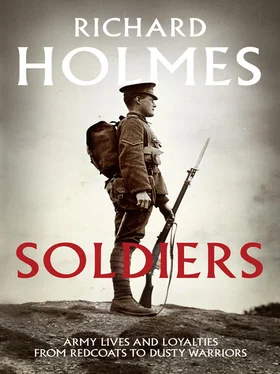This is not a chronological history of the army and its achievements. There have been many published in my working lifetime, with Correlli Barnett’s Britain and Her Army (1970) wearing its judgements well even where recent scholarship has advanced our detailed knowledge. Allan Mallinson’s The Making of the British Army (2009) is the most recent easily accessible account. This book is instead a social history of the soldier. Its organisation is thematic rather than chronological, and its preoccupation not with big battles or frontier scrimmages, but with the myriad routine observances of military life. It is the story of a man as ancient as a redcoat in Charles II’s Tangier garrison and as modern as the gate-guard on Camp Bastion. It also concerns the women who followed him, anxiously watched his progress from afar or, more recently, soldiered with him. Given the immense change in Britain over the past three centuries, it would be inconceivable for the soldier not to have changed too. What surprises me, as I get ready to endure the fug of our first barrack room, is not how much he has changed: but how little.

POLITICS AND POSITION
CHAPTER 1
CHUCK HIM OUT, THE BRUTE

WRITING JUST AFTER the First World War, Field Marshal Sir William Robertson maintained that ‘the army is not popular in the sense that the navy is. The latter usually enjoys full public support, the army seldom does except in war, and consequently it labours under considerable disadvantages in order to prepare for war, and from this it has followed that our wars have so often been a case of muddling through.’ 1
To the high Victorians, the British soldier was Tommy Atkins. The nickname probably originated in an 1815 War Office publication showing how the Soldier’s Pocket Book should be filled out, giving ‘Private Thomas Atkins, No 6 Troop, 6th Dragoons’ as its exemplar. By 1837 Atkins was a sergeant, and could sign his name rather than scrawl a mark. We are sometimes told that the name was chosen by the Duke of Wellington. He remembered the pivot man of the grenadier company of his regiment, the 33rd Foot, dying in Flanders in 1793 with the stoic words ‘Never mind, Sir, it’s all in the day’s work.’ However, Wellington did not become commander-in-chief of the army till 1827, so it is very unlikely that he would have been consulted. In 1883 the Illustrated London News showed ‘Pte Tommy Atkins returning from Indian Service’, and in 1892 Rudyard Kipling dedicated his Barrack Room Ballads to ‘T.A.’ The collection included ‘Tommy’, Kipling’s visceral condemnation of society’s predilection for ‘makin’ mock o’ uniforms that guard you while you sleep’, which concluded:
For it’s Tommy this, an’ Tommy that, an’ ‘Chuck him out, the brute!’
But it’s ‘Saviour of ’is country’ when the guns begin to shoot;
An’ it’s Tommy this, an’ Tommy that, an’ anything you please;
An’ Tommy ain’t a blooming fool – you bet that Tommy sees! 2
Ambivalence about the redcoat long predated Kipling. To the Georgians he was Mr Lobster, a nickname stemming from a 1740 dialogue between ‘Thomas Lobster, soldier, and Jack Tar, sailor’, in the political news-sheet The Craftsman, a periodical so offensive to Prime Minister Robert Walpole that he had its publisher arrested every six months as a matter of course. The conversation redounded little to Mr Lobster’s advantage, for while he was weighed down by firm discipline and a heavy pack, plied his murderous trade at close quarters and was commanded by popinjays who had bought their commissions, his apple-cheeked interlocutor cruised the rolling main, defending Britain’s maritime prosperity, and returned to a grateful nation enriched by prize money. Nearly a century later Portsmouth’s ladies of the night made their own preferences clear:
Sailors they get all the money
Soldiers they get nought but brass.
I do love a jolly sailor
Soldiers you may kiss my arse.
Part of the reason for the nation’s long-standing suspicion of her soldiers can be traced to the circumstances prior to the regular army’s formation in 1661. Britain had just emerged from a long civil war, and had had quite enough of soldiers, whether they had fought for king or Parliament. Moreover, in 1655–7 Oliver Cromwell had instituted direct military government in England and Wales, through major generals presiding over twelve regions, answerable to the lord protector himself. Although the proximate cause of the experiment was a series of royalist plots, Cromwell believed that the nation’s morals needed urgent reform. The major generals, their troops of cavalry funded by a 10 per cent ‘decimation tax’ on royalists, stamped out seditious and ungodly pastimes like horse-racing, plays, bear-baiting and cock-fighting, and closed unruly ale-houses. They also punished those guilty of licentiousness, blasphemy, and swearing.
Although the rule of the major generals was unpopular, the scars left by the Civil War were far deeper. As historian Charles Carlton has observed, ‘No standing army’ was a Restoration slogan driven by ‘fear of soldiers, not because they killed people, but because they turned society head over heels’. 3Oxford scholar Anthony Wood thought that his fellow undergraduates who went off to be soldiers were ‘debauched’ by the experience. Although Bulstrode Whitelock, Cromwell’s ambassador to Sweden, was on the winning side when he told his hosts of the horrors of civil war, he believed that his fellow-countrymen were heartily sick of ‘seeing servants riding on horseback and masters in great want’. 4
Although most of the New Model Army’s officers were not much different from their cavalier opponents – Lord General Fairfax was a peer’s son and Lieutenant General Cromwell a country gentleman – enough of them rose from humble beginnings to high rank to cause affront. Cromwell’s assertion that ‘I had rather have a plain russet-coated captain that knows what he fights for and loves what he knows, than that which you call a gentleman and is nothing else’ struck a jarring chord within a stratified society used to obeying its natural leaders. 5Amongst the reasons for the long-standing practice of the purchase of commissions, which disappeared only in 1871, was a desire to ensure that officers were gentlemen rather than enthusiasts.
Part of it was about national identity. The Civil War was not simply an English phenomenon, but had extended across each of the three kingdoms ruled by Charles I. It was at its most bloody in Ireland, where its agonies reflected long-standing religious frictions, and each new episode, from the revolt of 1641 to the Cromwellian pacification of 1649–53, simply added fresh horrors, with new heroes and martyrs, to a list that was long enough already. The Scots seemed to have prospered from their early alliance with Parliament, but their war soon turned sour. There was a bitter conflict within Scottish society: part clan feud, part power struggle, part confessional dispute. Alongside this there was an external war which saw Scots royalists suffer appallingly in their invasions of England in 1648 and 1651. So many were sent off as bondsmen to the West Indies after their defeat at Worcester, that merchants complained there was no profit in shipping them out. Suspicion of the soldier was writ large enough in England, but in Ireland and Scotland it was seared on the national consciousness.
Читать дальше














